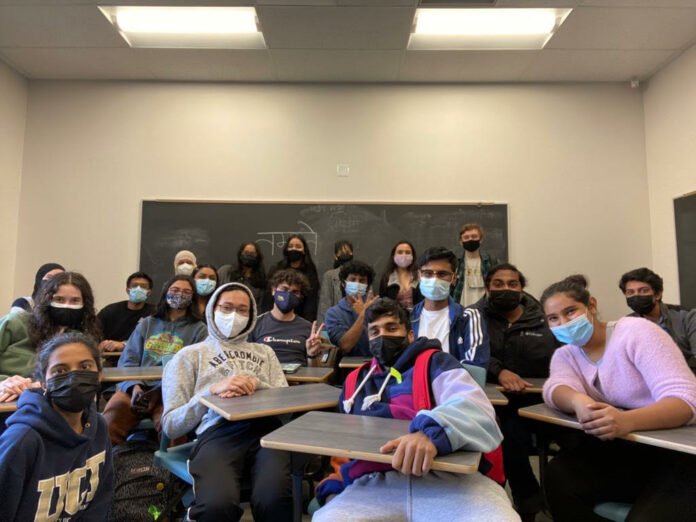The UC Davis lecturer discusses the effects of Trump-era politics and COVID-19 on her work and life in California
By ADAM KIRCHOFF — features@theaggie.org
Taking out the trash — an unappealing, albeit necessary job for virtually all of us. We’re forced to complete the chore without much attention, other than perhaps the thought of the garbage stench that often floods our olfactory system while doing so. But for UC Davis professor Shagufta Fatema, this menial task represents major strides in her independence.
Professor Fatema, a UC Davis lecturer in Middle East & South Asian Studies, traveled to the U.S. from India to pursue the aspiration of an established career and family in the Western world.
When she arrived in 2011 as a young Muslim woman, Fatema found herself having the freedom, and need, to be self-reliant, which she had previously only associated with men in her native society.
“[Women] often don’t go to the markets, we don’t drive, even if I have to go to my school, my father or brother will drop me off,” Fatema said. “So taking out the trash for the first time […] it was a hectic job for me. I remember I clicked a picture of it and sent it to my mom, saying ‘look what I’m doing.’”
While she did have a lot of new freedom, Fatema encountered obstacles in American culture — not only concerning standard societal disparities, but also ones brought on both by discriminatory Trump-era policies and the COVID-19 pandemic.
“There was a culture shock,” Fatema said. “But it made me realize that you have to be dependent on yourself.”
When she first arrived at UC Davis in 2011, where she’d accepted a position as a teaching assistant in the Fulbright Visiting Scholar Program, Fatema remembers feeling welcomed by American life. After teaching for just two quarters at UC Davis, she said that she embraced Northern California as her second home.
In Davis, Fatema felt like she could express her cultural identity — in some ways even more so than she could back home in India. By getting involved with the Muslim Student Association and International House Davis, she bonded with a cohort of diverse individuals with similar experiences. She felt as if — for the first time — the way she practiced her faith was driven entirely by her own volition.
However, despite the comfort she felt in her new hometown, Fatema felt alienated by the U.S. federal government’s executive leadership.
In June of 2020, former President Donald Trump signed an executive order that froze access to new H-1B visas — which are temporary employment-based visas that permitted Fatema and many other foreign national professionals to reside in the U.S. while working. Trump’s administration justified the order as a necessary response to high unemployment rates during the pandemic, which reached 14.7% in April 2020, a level not seen since the Great Depression.
Although the order could be interpreted as a prioritization of American workers, it also carried xenophobic connotations, given the administration’s inflammatory history with immigration policy. Notoriously, former President Trump cemented his political legacy around anti-immigrant sentiment and 2016 campaign promises that ostracized people of Muslim faith.
“It was injustice,” Fatema said. “I learned from my [Human Resources Department] that our visas could not be processed. The universities had no choices. Even if the university wanted us, [Trump] was stopping us.”
Fatema continued teaching her Hindi/Urdu courses from across the world via Zoom. This carried its own distinct set of challenges — including a nearly 14-hour time difference between her and her students.
The block on these visas has since been lifted, since President Joe Biden opted to not renew the ban after taking office in early 2021. Although Fatema’s chances of reuniting with California seemed increasingly promising in the wake of this policy shift, her home life took a tragic turn last summer as the catastrophic COVID-19 Delta variant surged through India.
In June, Fatema lost her mother to COVID-19 complications. Without her mother, Fatema explained that though she still values and loves her family, she no longer feels the same strong connection to her first home. Without feeling as anchored to her hometown and amidst this devastating loss, Fatema decided to leave India and settle overseas more permanently.
“He is excited for our travels tomorrow,” Fatema said over the phone of her young son Zohan, as he squealed in the background with pure excitement. In preparation for teaching in person again in spring 2022, Fatema is journeying back to the U.S. with her son — and her husband — for the first time since the outbreak of the COVID-19 pandemic.
“I wanted my son to be educated here in the States, so he is not dependent like many of us [in India],” Fatema said. “I am preparing this for my nuclear family, so I do want some distance [from home].”
Fatema is looking forward to reuniting with her students in person, which she said allows her to maximize the liveliness and energy of her courses. From holding class meetings in coffee shops to organizing picnics and basketball games for her students, fostering a dynamic learning environment is Professor Fatema’s “unique selling proposition.”
“Language cannot be learned in isolation, that is the one rule,” Fatema said. “My classes are energetic when I organize these things. When my students are involved completely, they love it.”
Written by: Adam Kirchoff — features@theaggie.org




